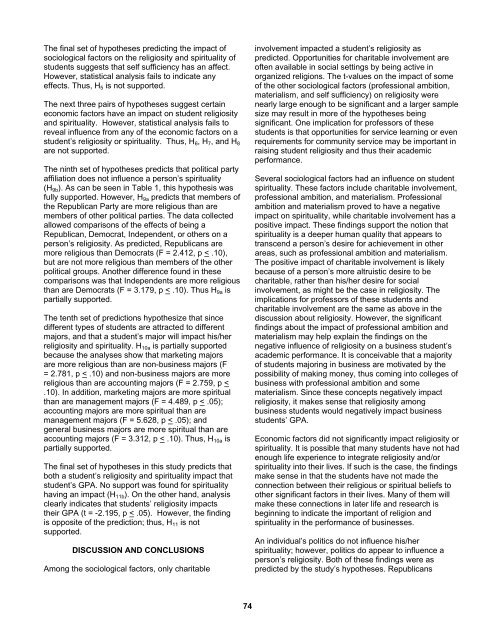2008 - Marketing Educators' Association
2008 - Marketing Educators' Association
2008 - Marketing Educators' Association
Create successful ePaper yourself
Turn your PDF publications into a flip-book with our unique Google optimized e-Paper software.
The final set of hypotheses predicting the impact of<br />
sociological factors on the religiosity and spirituality of<br />
students suggests that self sufficiency has an affect.<br />
However, statistical analysis fails to indicate any<br />
effects. Thus, H5 is not supported.<br />
The next three pairs of hypotheses suggest certain<br />
economic factors have an impact on student religiosity<br />
and spirituality. However, statistical analysis fails to<br />
reveal influence from any of the economic factors on a<br />
student’s religiosity or spirituality. Thus, H6, H7, and H8<br />
are not supported.<br />
The ninth set of hypotheses predicts that political party<br />
affiliation does not influence a person’s spirituality<br />
(H9b). As can be seen in Table 1, this hypothesis was<br />
fully supported. However, H9a predicts that members of<br />
the Republican Party are more religious than are<br />
members of other political parties. The data collected<br />
allowed comparisons of the effects of being a<br />
Republican, Democrat, Independent, or others on a<br />
person’s religiosity. As predicted, Republicans are<br />
more religious than Democrats (F = 2.412, p < .10),<br />
but are not more religious than members of the other<br />
political groups. Another difference found in these<br />
comparisons was that Independents are more religious<br />
than are Democrats (F = 3.179, p < .10). Thus H9a is<br />
partially supported.<br />
The tenth set of predictions hypothesize that since<br />
different types of students are attracted to different<br />
majors, and that a student’s major will impact his/her<br />
religiosity and spirituality. H10a is partially supported<br />
because the analyses show that marketing majors<br />
are more religious than are non-business majors (F<br />
= 2.781, p < .10) and non-business majors are more<br />
religious than are accounting majors (F = 2.759, p <<br />
.10). In addition, marketing majors are more spiritual<br />
than are management majors (F = 4.489, p < .05);<br />
accounting majors are more spiritual than are<br />
management majors (F = 5.628, p < .05); and<br />
general business majors are more spiritual than are<br />
accounting majors (F = 3.312, p < .10). Thus, H10a is<br />
partially supported.<br />
The final set of hypotheses in this study predicts that<br />
both a student’s religiosity and spirituality impact that<br />
student’s GPA. No support was found for spirituality<br />
having an impact (H11b). On the other hand, analysis<br />
clearly indicates that students’ religiosity impacts<br />
their GPA (t = -2.195, p < .05). However, the finding<br />
is opposite of the prediction; thus, H11 is not<br />
supported.<br />
DISCUSSION AND CONCLUSIONS<br />
Among the sociological factors, only charitable<br />
74<br />
involvement impacted a student’s religiosity as<br />
predicted. Opportunities for charitable involvement are<br />
often available in social settings by being active in<br />
organized religions. The t-values on the impact of some<br />
of the other sociological factors (professional ambition,<br />
materialism, and self sufficiency) on religiosity were<br />
nearly large enough to be significant and a larger sample<br />
size may result in more of the hypotheses being<br />
significant. One implication for professors of these<br />
students is that opportunities for service learning or even<br />
requirements for community service may be important in<br />
raising student religiosity and thus their academic<br />
performance.<br />
Several sociological factors had an influence on student<br />
spirituality. These factors include charitable involvement,<br />
professional ambition, and materialism. Professional<br />
ambition and materialism proved to have a negative<br />
impact on spirituality, while charitable involvement has a<br />
positive impact. These findings support the notion that<br />
spirituality is a deeper human quality that appears to<br />
transcend a person’s desire for achievement in other<br />
areas, such as professional ambition and materialism.<br />
The positive impact of charitable involvement is likely<br />
because of a person’s more altruistic desire to be<br />
charitable, rather than his/her desire for social<br />
involvement, as might be the case in religiosity. The<br />
implications for professors of these students and<br />
charitable involvement are the same as above in the<br />
discussion about religiosity. However, the significant<br />
findings about the impact of professional ambition and<br />
materialism may help explain the findings on the<br />
negative influence of religiosity on a business student’s<br />
academic performance. It is conceivable that a majority<br />
of students majoring in business are motivated by the<br />
possibility of making money, thus coming into colleges of<br />
business with professional ambition and some<br />
materialism. Since these concepts negatively impact<br />
religiosity, it makes sense that religiosity among<br />
business students would negatively impact business<br />
students’ GPA.<br />
Economic factors did not significantly impact religiosity or<br />
spirituality. It is possible that many students have not had<br />
enough life experience to integrate religiosity and/or<br />
spirituality into their lives. If such is the case, the findings<br />
make sense in that the students have not made the<br />
connection between their religious or spiritual beliefs to<br />
other significant factors in their lives. Many of them will<br />
make these connections in later life and research is<br />
beginning to indicate the important of religion and<br />
spirituality in the performance of businesses.<br />
An individual’s politics do not influence his/her<br />
spirituality; however, politics do appear to influence a<br />
person’s religiosity. Both of these findings were as<br />
predicted by the study’s hypotheses. Republicans


